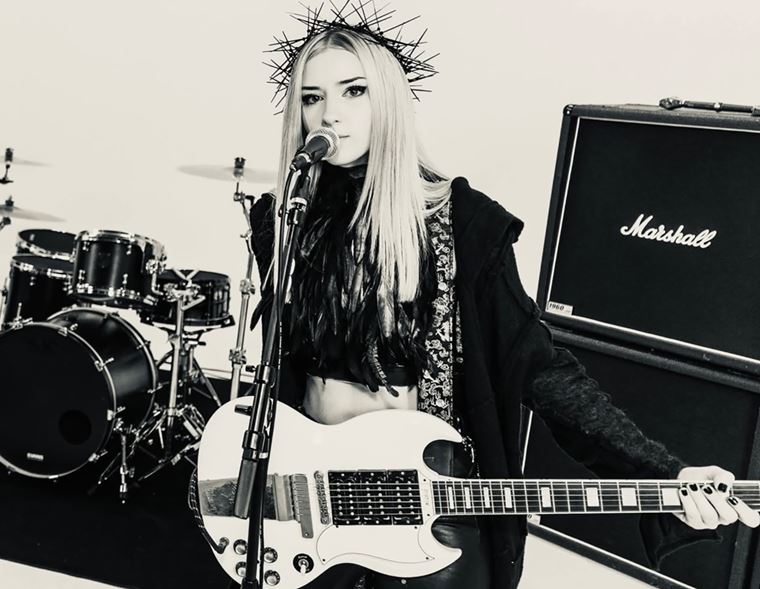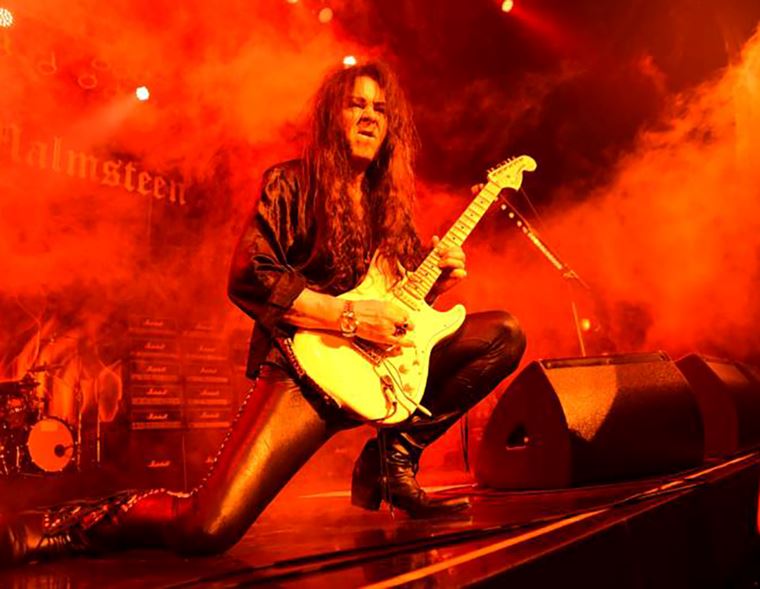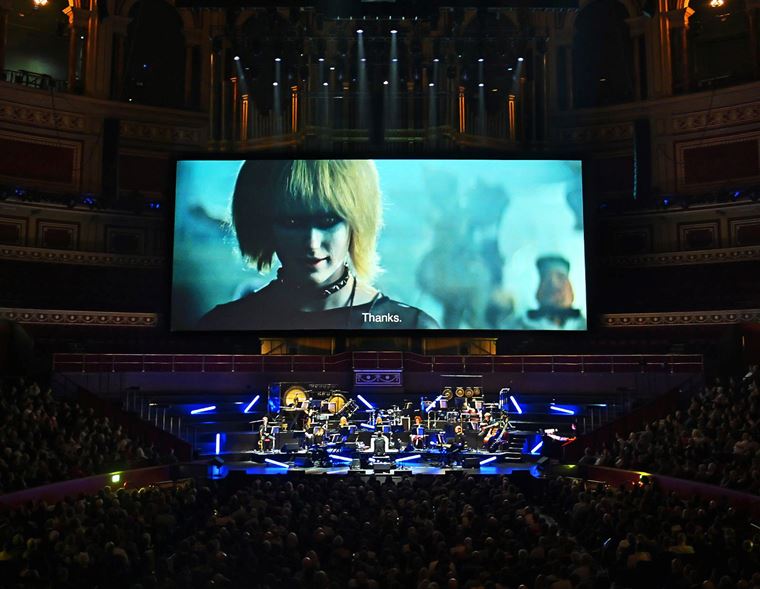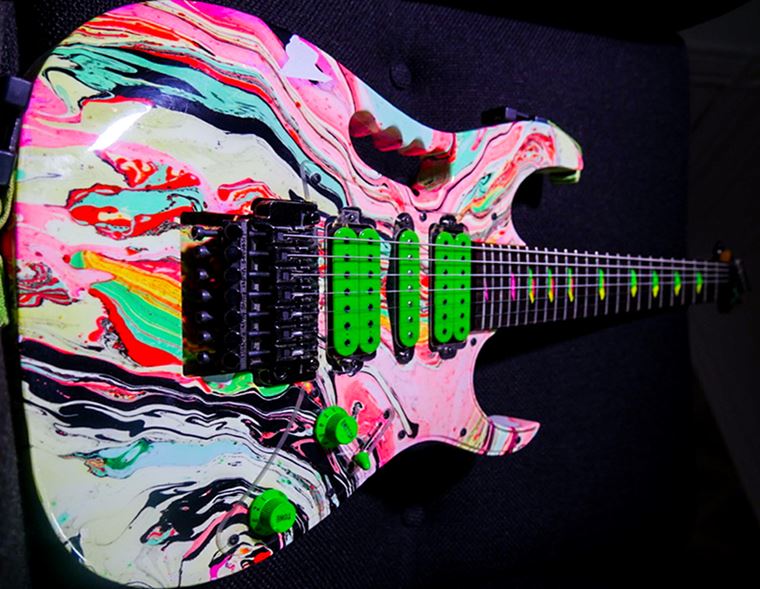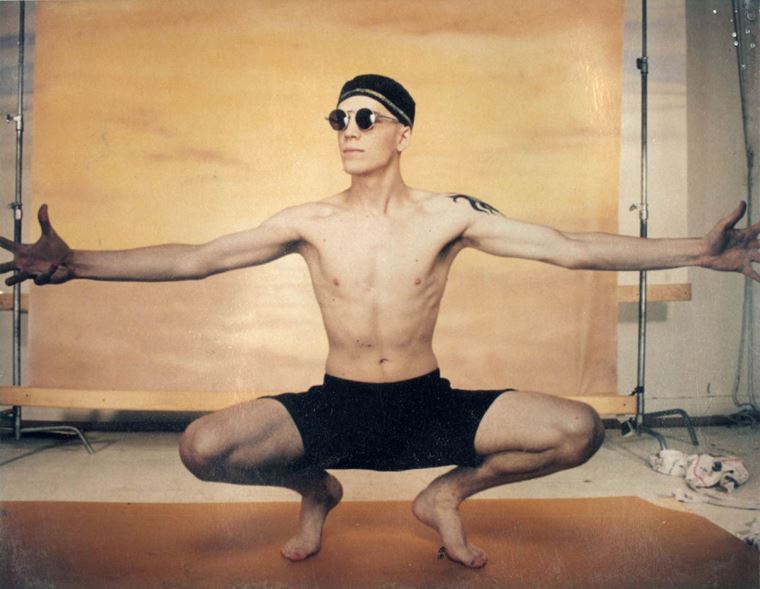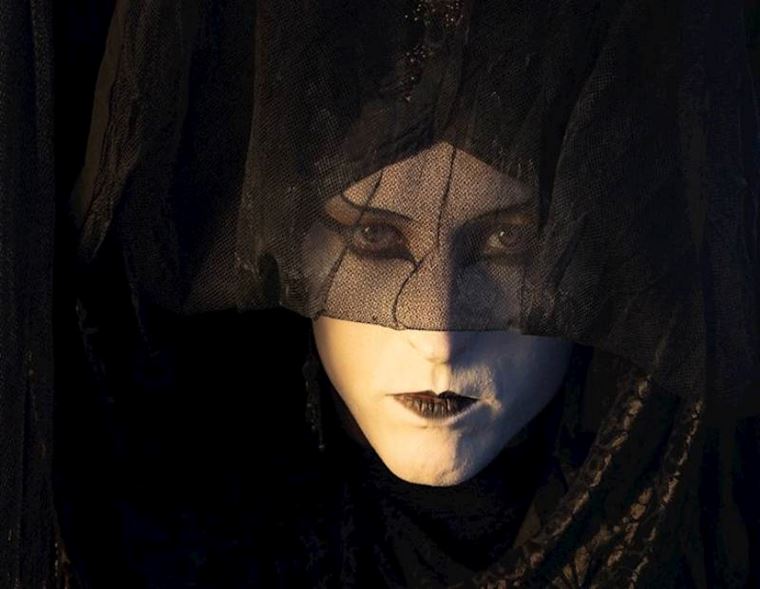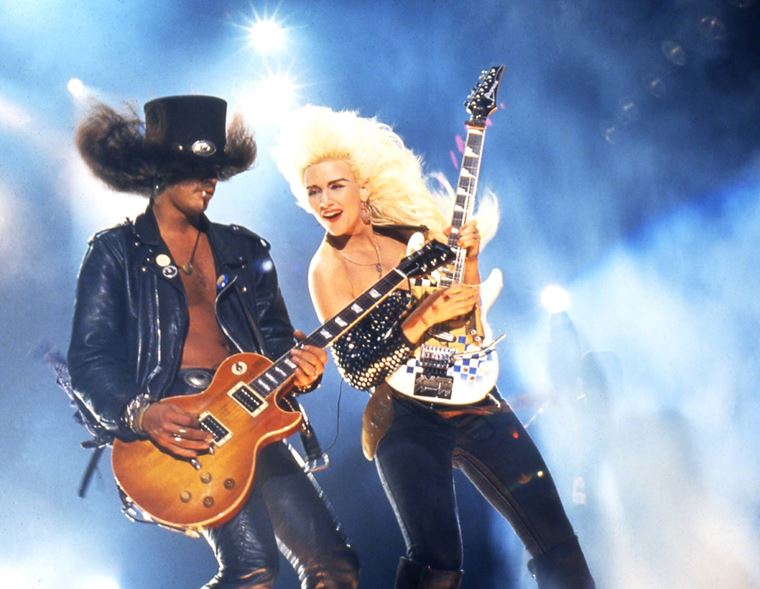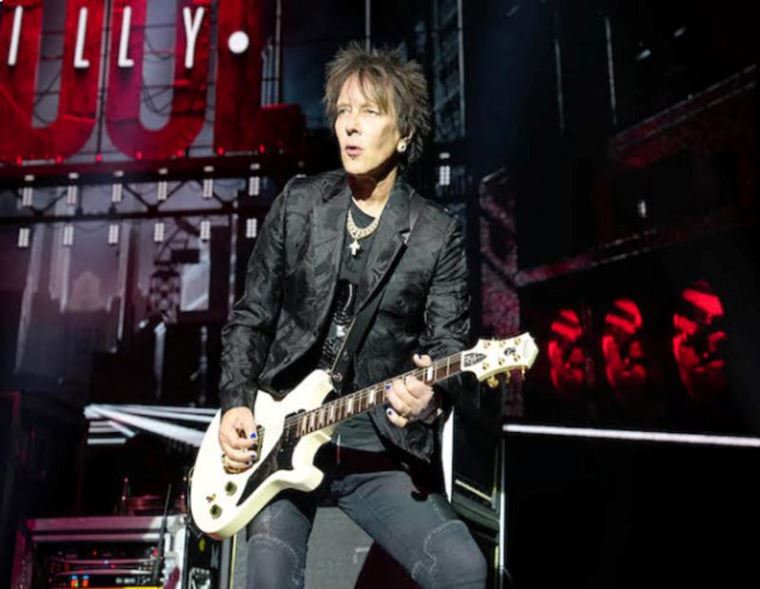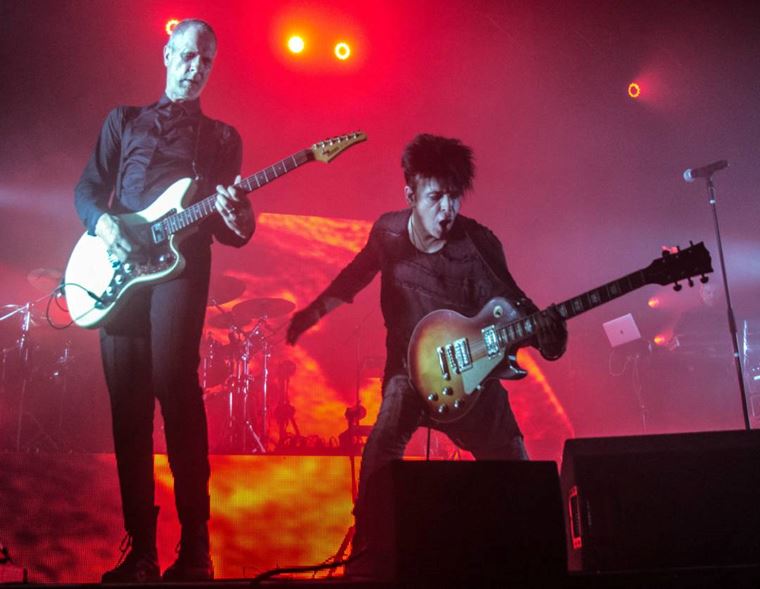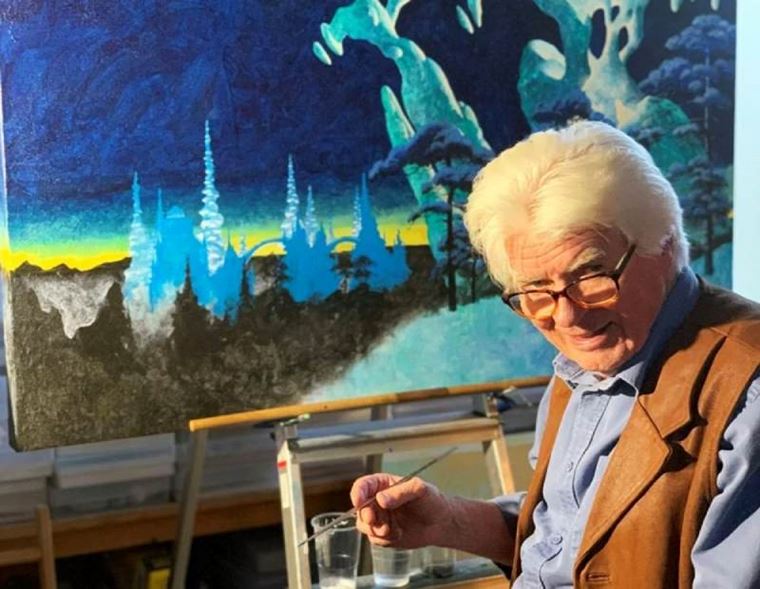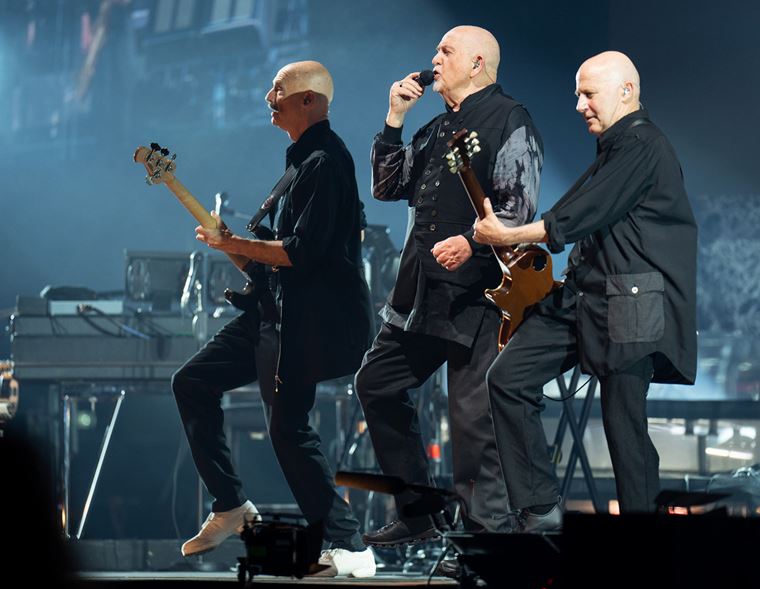BILLY DUFFY: 40 Years of The Cult and Believing in the Power of Rock n Roll! Exclusive INTERVIEW
Published on 13 November 2024
This year marks 40 years of post-punk hard rockers The Cult, whose giant-sized singles and epic rock moves have seen them become one of the most well-loved and respected rock bands ever. From their beginnings in the north of England as the Southern Death Cult, to the Death Cult and then simply The Cult, Ian Astbury and Billy Duffy’s potent partnership has brought the world an enviable catalogue of songs dusted with hard rock and dipped in shamanic energy.
40 years is a wonderful milestone for any band, and the Cult have been celebrating in style these last few months with a UK and European tour. Drawing from all eras of the band - from 1984’s Dreamtime to 2022’s Under the Midnight Sun - The Cult are firing on full force and remain a band with hunger and drive.
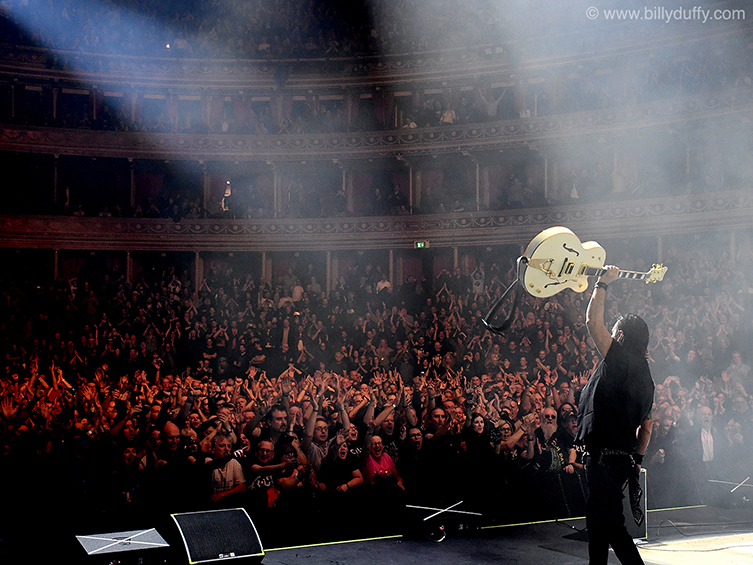
2024 also (roughly) marks 40 years of another relationship: Billy with Gretsch guitars. As one of the most prominent White Falcon players in the world, Duffy has been suitably rewarded with a limited edition signature model, which should be hitting the streets exactly as this article goes live online!
Cult fans may already have read my previous interview with Billy from 5 years ago (and if you missed it, click through here to the guitarguitar Billy Duffy Interview). My memories of the encounter were warm: indeed, he’s been one of the most friendly and entertaining people I’ve spoken with, so the notion of having another conversation was definitely something I wanted to pursue! Thankfully, Billy agreed to a chat, and so I found myself negotiating the backstage labyrinth of the Edinburgh Usher Hall a few weeks ago, amidst the excitement of a rock show on the road.
I’d luckily managed to snare a conversation with the incredible and otherworldly support act Jonathan Hulten earlier in the day (look out for that one soon!) so my day was happily busy. As late afternoon approached, a phone call halted my pit stop meal of pub chips and an alcohol-free Guinness, and I was summoned back to the venue for another highly enjoyable conversation about guitars, riffs, influence and style with Billy.
Here’s how it went…
Billy Duffy Interview
After our hellos, we get sat down and Billy is talking about the venue we are in, the Edinburgh Usher Hall.
Billy Duffy: I did pick this venue. I was looking at what type of places we wanna play, and I was trying to get the Playhouse or here. I just wanted this tour to be more, I guess, proper.
Guitarguitar: I know what you mean. This is probably a better shout than the Playhouse with the size, and the fact that you can take out the seats.
BD: I’ve only done the Playhouse once, in ‘89 and I know it’s legitimate, but we were just trying to do something different from the Barrowlands, not that there’s anything wrong with the Barrowlands.
GG: Of course. As a man based in Glasgow, it’s important to say that, haha!
BD: Yeah, yeah, and mean it!
GG: So yeah, it’s 40 years of The Cult and it’s 40 years of you being a Gretsch player, right?
BD: More, yeah, 42 probably for Gretsch. I think I got my first one in 1981. When I joined Theatre of Hate, I went down the shops and bought a Gretsch. I went from a Les Paul Junior - double cutaway, Cherry, those are the ones you could get - I went from that to a White Falcon. It was only a double cutaway White Falcon, I wanted the single cut but I couldn’t find one in London.
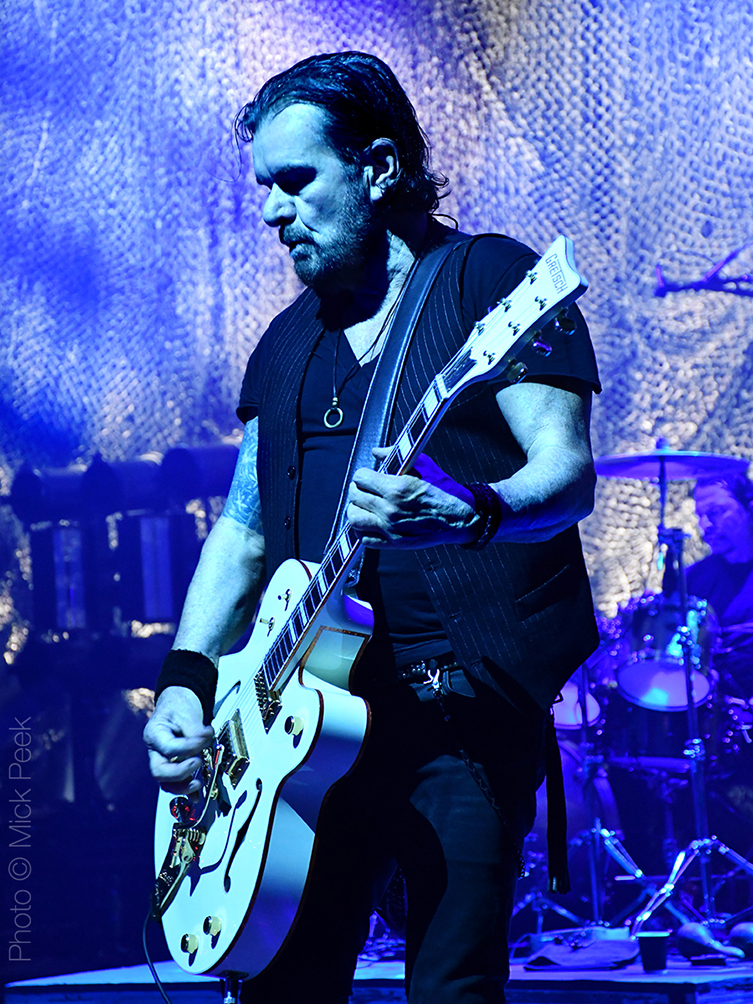
(Photo: Mick Peek)
GG: Did you want that deeper body?
BD: Yeah, and I just liked the look of it better: I don’t like the look of double cutaway guitars as a rule, it’s never been my thing, but needs must so I got that. Then it turned out to be a stereo one, which is even worse (laughs). But in the end, in fairness, I do actually like those double cutaway Falcons from that era. For a double cutaway guitar, I find them quite comfortable to play.
GG: All of your signature ones have always been single cuts, though, yeah?
BD: Yeah, they have yeah.
GG: And so this new one: I’ve only seen a quick photo of it because it’s still under embargo with Fender…
BD: Yeah, I’ve got one up there (on stage), I’m playing it tonight.
GG: Nice! So we say your signature one last time with the chrome and the silver binding. This one is more like a classic ‘proper’ White Falcon with the gold and everything, Was that on purpose?
BD: Yeah, there’s no new anything electronically, it was just more of a tribute to the old classic guitar. So it’s more of a vintage white, and gold hardware. That’s it really! Hand-signed, just a limited amount. I said ‘do 40’, one for every year or whatever, but they said there’s more demand than that, so we ended up doing a hundred.
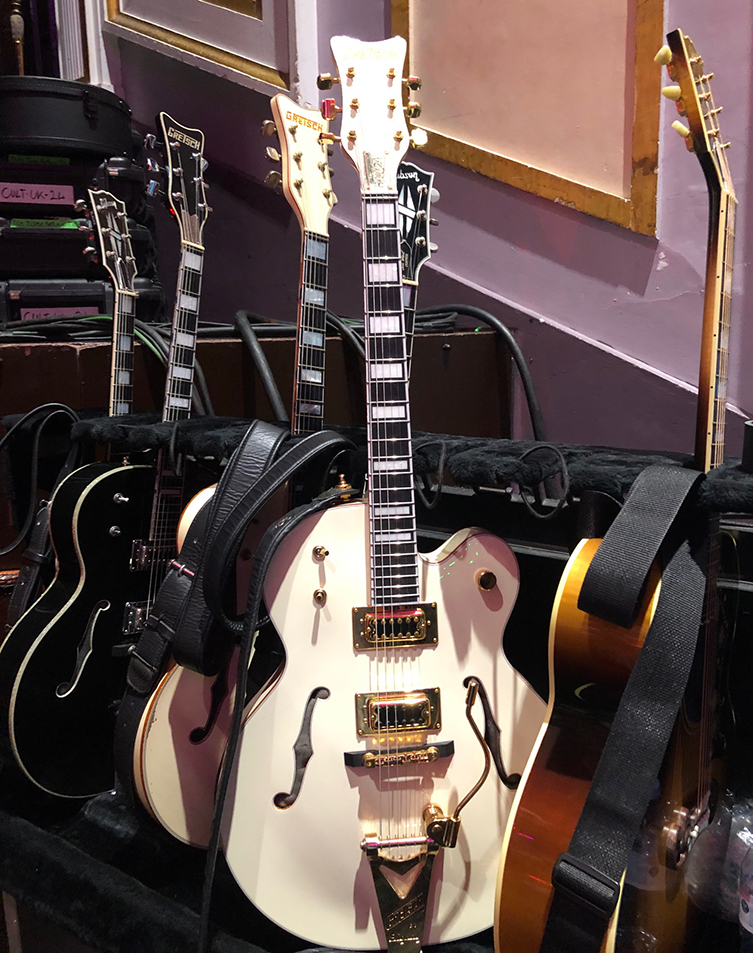
(Photo: Ray McClelland)
GG: So is it higher gain pickups you’ve got in them?
BD: Yeah. The story with that pickup is, it’s one that Seymour Duncan made for me when we were trying to do the Electric album, but the version before we went to New York and did it with Rick Rubin. So it’s the English version called The Manor Sessions, which is Electric done more like the Love album but not quite.
I needed more horsepower out of the pickup. That’s the thing about the Baldwin-era guitars (70s Gretsches were made under licence by Baldwin. See previous interview with Billy! - Ray): I like everything about them apart from the pickups. That’s the only thing. They’re dogshit! At the time, in 1986 - in England - it was not a thing to go ‘Oh, I’ll just get this fellow TV Jones to knock me up a few’ (laughs) or ‘I’ll dismantle an old Gretsch and take out on old Filter’tron’, which are better pickups.
"You know the reverb you get when you go to a church? Gretsches, to me, provide that like no other guitar. There's an air and a magic to them."
So, I knew Seymour Duncan’s son, Chris Duncan, and I'd been to their factory in Santa Barbara when I first went to California. Based on that relationship, Seymour Duncan said ‘send me a cassette of the sound you like and I’ll try to make it’. I wanted to keep the chunk of a Les Paul - that percussive punch from the bottom strings - but the kind of beautiful Gretsch, what I’ve described many times badly as a kind of ‘cathedral’...
GG: I don’t think that’s a bad description at all.
BD: You know, like when you go to a church, the reverb you get? Gretsches, to me, provide that like no other guitar. There’s an air and a magic to them.
Postpunk Players and the Appeal of Hollow Bodies
GG: Yeah, like a sort of sonic width. I have a theory - and I was going to come to this later on - but it seems like a good place now.
BD: Ok.
GG: Post-punk era guitar players like yourself - and I’m not comparing you to anyone else - but I’m thinking: certain bits of that more arpeggio-riffy stuff that you do is similar to Geordie Walker from Killing Joke. And you both have entirely hollow guitars, a big wide sound, and you’re both the only guitarists in your respective bands. I’m thinking: is this one of those situations where the guitar imposes its will on the player?
BD: Yeah! Certainly in my case. Geordie went for a much thicker bottom end then I did, and he used those Burman amps, but he used a lot of chorus. Almost over-chorus, but he had that magical right hand that still to this day, I can’t understand what I’m seeing and what I’m hearing! (laughs)
I think what it was, in my opinion, was a bunch of fans of punk rock who wanted to create their own sound and the instrument was the tool. The limitations of the instrument: rather than going ‘I’m gonna use a Les Paul or a Telecaster or a Strat’ - you know, very predictable - we were looking in some way, shape or form for something interesting. To me, all the cool guys did, anyway.
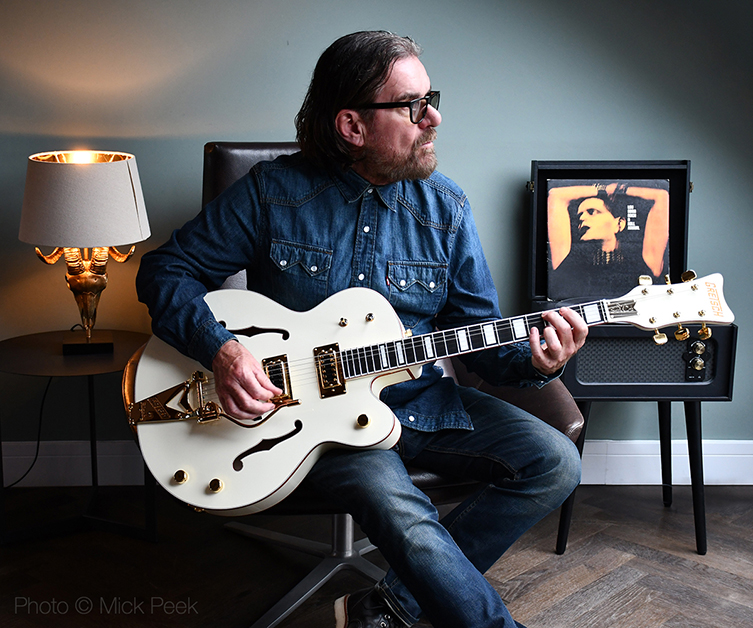
(Photo: Mick Peek)
GG: This is another thing, actually. Between the White Falcon and your other main guitar, the Les Paul Custom, they are ‘cool guy’ guitars, in my opinion. I think of you as an all-round player but very much a riff guy: is that the reason you don’t play Strats? They aren’t really riff guitars, are they?
BD: They’re not, no. I never got along with the Strat. What it stems back to is my childhood. When I was growing up, everybody seemed to want to be Jimi Hendrix and they all bought Strats. We started going to gigs and I just liked the Les Paul players. Certain other people I knew were gravitating more towards Rory Gallagher and the Strat thing.
The Strat’s a ‘thing’, you know? It’s its own thing, and it’s something I’ve barely ever drawn upon.
GG: Again, it’s that theory about the guitars imposing their will on the player, right?
BD: Yeah.
"Geordie Walker had that magical tight hand that still - to this day - I can't understand what I'm seeing and what I'm hearing"
GG: I don’t know about you, but when I plug in a Strat, I change my playing a wee bit to become a ‘Strat guy’.
BD: Yeah, there's a ‘Strat guy’ thing. (laughs) Definitely. It was never for me, it never spoke to me.
GG: And weirdly, with a lot of the post punk players I was thinking about earlier, it isn’t about the Gibson ES-335 either.
BD: Yeah, the 335 - which I admire - is always a bit…smoothy bluesey, a bit easy blues. I want a bit of a struggle. Actually, I was doing some daft TV thing in America with Johnny Lydon and he said something very profound. We were judging bands in a battle of the bands thing, and he said to this band - they were young kids and they were great - they were doing blues and he said: ‘But I don’t think you can play the blues unless you’ve really suffered. How can you play the blues?’ And they were sweet middle class American kids who’d obviously had lots of guitar lessons and lovely amps, great guitars. It was all a bit like ‘where’s the suffering?’ It was a bit of a pastiche, if you’re taking a music born out of whatever angst and desperation…
Anyway, for me I like to fight a bit with the guitar. The 335’s too easy! A Strat - like you say - makes you become that ‘thing’. I believe you can make more of your own mark on a Les Paul. You can go in several directions.
GG: Yeah exactly, the top Les Paul guys aren’t that related, musically.
BD: No.
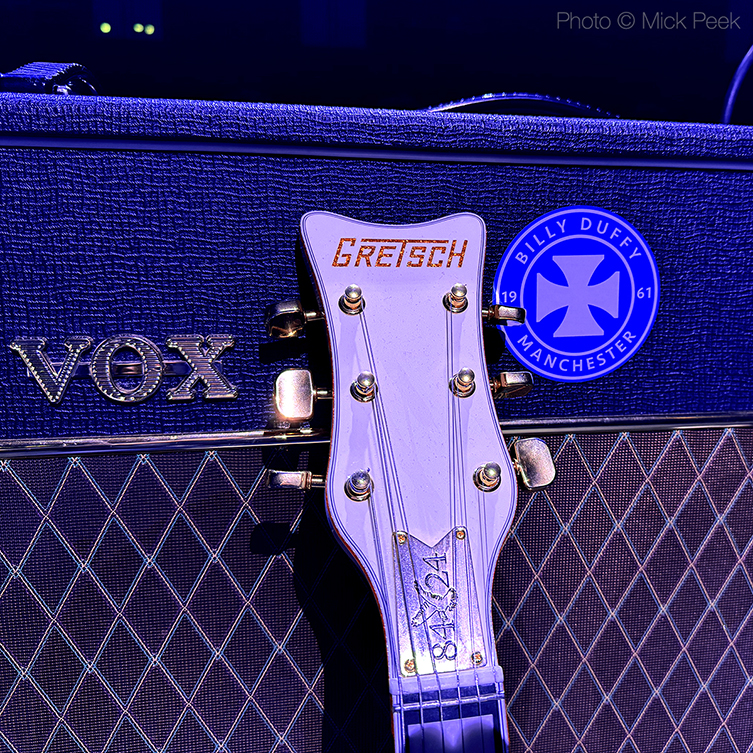
(Photo: Mick Peek)
GG: That’s interesting! And also with Gretsch, that ‘great Gretsch sound’ they like advertising - and it’s certainly a thing - doesn’t impose itself in the same way those other guitars might. You can put your own version of it out there.
BD: Yeah, you can do. It’s a difficult guitar. My claim to infamy is, I just thought, what if we tried to get a Gretsch…it was kind of like what Geordie was doing, in the sense that he was really overdriving those Burmans and getting a very thick sound, but with the shimmering chorus. I tried to go down a more rock n roll, lead, wah-wah thing with it, and see what it would be like: an overdriven Gretsch with a wah-wah. I wanted more aggression. And getting that pickup that we just referred to, was my attempt. I knew I wasn’t getting enough. The irony is, we actually sent Seymour Duncan a recording of a Telecaster with a humbucker in it.
GG: As a reference for the pickup you wanted for your Gretsch?
BD: Yeah, I just sent him the sound. It was a Tele with a humbucker, going through a Marshall probably, and it had some air but it also had that percussive punch. It had that jab that I like, like in a boxing analogy. You want the riff to punch people, you know?
GG: You need that, don’t you?
BD: Yeah, you know what I mean? If a big crash chord’s like a knockout blow, I wanted that. Gretsches sometimes lacked that, that’s where they were deficient in my eye, particularly the pickups in those Baldwin era ones. So mine’s quite loud: it’s about as loud as you wanna go, otherwise you’ll get stupid feedback.
GG: Last time we spoke, you pointed out to me the thing about the Baldwin era guitar having smaller f-holes. It is more beautiful, but would that not also help with the feedback?
BD: Probably. I’ve stuffed the guitars full of foam, so they are hollow body guitars but as you can see from mine, they certainly aren’t hollow. They’re full of stuff.
GG: Yeah, they’re not behaving like hollow bodies.
BD: So they are and they aren’t. They have a resonance like a true semi acoustic, you know?
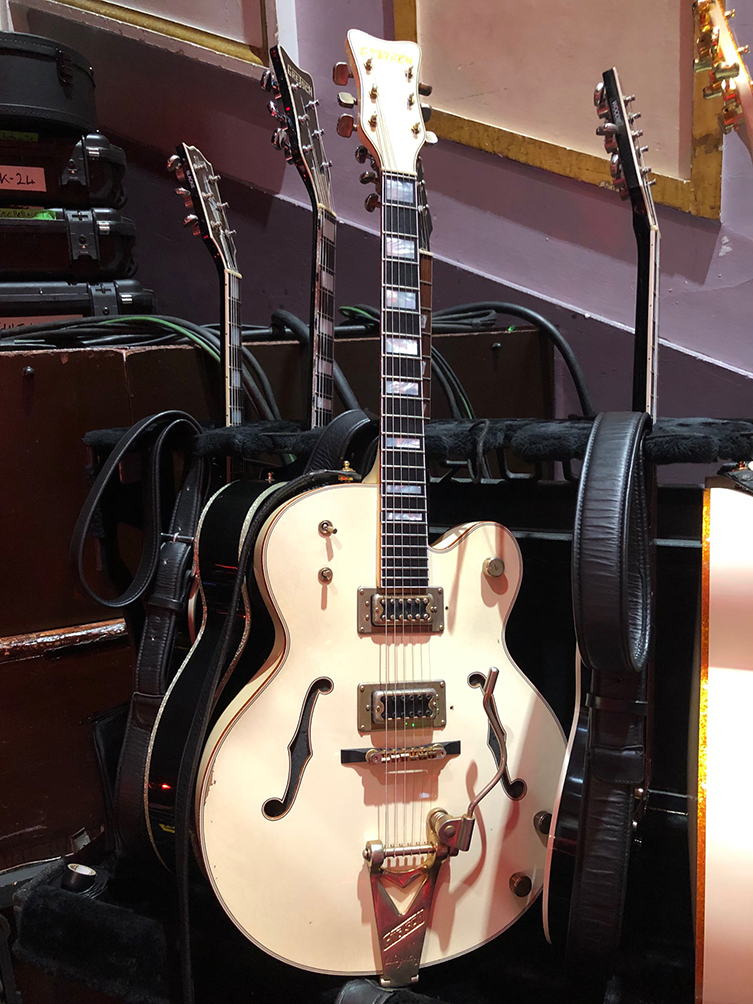
(Photo: Ray McClelland)
GG: Yeah, exactly. And presumably tonight you’ll be going between them and the Les Pauls?
BD: Yeah, same old routine! (laughs)
GG: Well, if it works! I’m thinking, do you ever still get the level problems, going between the Gretsch and the presumably louder Gibson?
BD: Well, as you can hear (guitar sounds are coming from the direction of the stage as we chat - Ray), my team are working through that on a daily basis! I needed to be able to go from a Les Paul to a Gretsch and there not be this gargantuan, cataclysmic volume change. I just don’t have the bandwidth mentally onstage to start adjusting. I’m not an adjuster! It’s like: on or off, let’s go! Is it on? Is it off?
Writing, Producers and the Power of Single Pickup Guitars
GG: Yes, exactly! Cool, cool. Now, last time we spoke was prior to the Midnight Sun album being released. I’m thinking about writing now, and you strike me as someone who is going to write on an electric guitar, rather than an acoustic.
BD: Yeah, oh I’m terrible on acoustics, fuckin’ horrible.
GG: Haha! That’s ironic, in a way, haha. So, would you be inclined to write more on a Gretsch? Or is it whatever you happen to have out at the time?
BD: I generally have one guitar in the house for a couple of months on the sofa. That can be a Gretsch, that can be a Les Paul, or even - but not often - I have a couple of the Squiers, but I put a Gretsch pickup in them. And I don’t know why one pickup is better than two, but it is! It just is. Even though I know the body has the routing for another pickup - in fact I’ve had this conversation with a lot of guitar dudes and nerds - and it’s just better. Why is a single pickup Flying V much more exciting - or a single pickup Firebird - than the regular ones? Is it because they’re rarer? Snob factor? To me, they just seem more street. Like, Chris Spedding used a single pickup Flying V with Brian Ferry.
GG: And also, the Les Paul Jr versus the Les Paul Special: the Special isn’t as cool.
BD: It’s not! It just isn’t! End of.
GG: It gives you everything and a little more but you don’t want it!
BD: No! I don’t know why, it makes no logical sense at all. Less is in fact more.
GG: It’s often the case. So, when you’re writing your tunes and you get a bunch of songs together, if you wrote it on a Les Paul, does it remain on a Les Paul?
BD: That varies. I’m not hard and fast on stuff like that. Generally, yeah, but I’m not rigid on it. It’s very collaborative these days, you know? In the olden days of the 1980s, you’d be more of an organic situation: we’d be in rehearsals or on the road or at soundcheck. I’d have a riff and the drummer would join in, we’d make something up and Ian would start something on it. Now it’s a much more laborious, torturous, electronic, demo type situation for a number of reasons.
"That's the thing about Baldwin-era Gretsches: I like everything about them apart from the pickups. They're dogshit!"
GG: Have you got a home setup?
BD: Yeah, it’s called my phone! Just literally voice memos.
GG: And you’ve got a wee Spark as well (I’ve spied a small Positive Grid Spark Mini amp over on a nearby table).
BD: Oh yeah, I use that. Johnny Marr turned me on to that. That is a namedrop (laughs), he did turn me on to that. ‘You have to buy this, buy it now’. He’s got five different ones. I’ve just got that one and it’s great. You’re playing some music and you plug the guitar in and you’re in the band!
GG: Aye, without having to piss about!
BD: That! That’s the key: without pissing about, because I don’t piss about very well (laughs). I just lose interest.
GG: Is that true of writing as well? You can have a back and forth with Ian, with short files and ideas?
BD: Generally, we’ve always been very collaborative, and still after all these years, there’s no Ian songs and Billy songs, even though essentially, there probably are if you got scientific about it! But they’re not anything until both of us get to them and then they’re just Cult songs. Generally we try and find a producer, or one waddles into our lives and that seems to be the guy who can be the referee, because a lot of times we might want the same thing but our language might be different. There’s a lot of not fully understanding, and that’s where the producers work. We’ve always had strong producers, really.
GG: Yeah, you mentioned Rick Rubin earlier.
BD: Yeah, and we’ve had John Brand. The first album, Dreamtime, we tried with a fellah called Joe Julian who did Adam & the Ants. Didn’t work out with us, it ended up Baggar’s (Banquet, their record label at the time) told us off for being naughty and sent us to Rockfield with John Brand, who wasn’t a choice of ours, but he was an efficient, sensible, reliable good all round producer who’d done Gene Loves Jezebel and a bunch of shit for Beggar’s.
So we finished the album with him with our tail between our legs, and then the next album we had Steve Brown who was his own force of nature in his own way. Then Rick Rubin, then Bob Rock who turned out to have quite a good career after us!
GG: He did one or two albums we might know about, yeah! (Bob Rock has produced Metallica, Bon Jovi, Bryan Adams etc - Ray)
BD: Key words ‘after us’ (laughs)! Not before us, after us!
GG: Claim that Metallica guitar sound because you worked with him first!
BD: That is my guitar, actually.
GG: For real?
BD: Nothing Else Matters, that’s my Gretsch. One of the backups, I sold it to Bob, he owns it. It wasn’t ever ‘The One’, but it was a Baldwin era Falcon. I ended up having too many of them and when we were doing Sonic Temple, I’d kind of gone away from the Gretsch. From Electric onwards the Les Paul took over for a bit, to the point where when we did the Ceremony tour - which was arguably the biggest attendances we ever did - I didn’t even use a Gretsch on that tour. It was all Les Pauls. From a sentimentality point of view and an aesthetic thing, it just feels right to have a Gretsch there, it would feel weird not to, now.
GG: It’s a part of your whole art now, isn’t it?
BD: Yeah, and it has an authenticity to it. It is a challenge to play it.
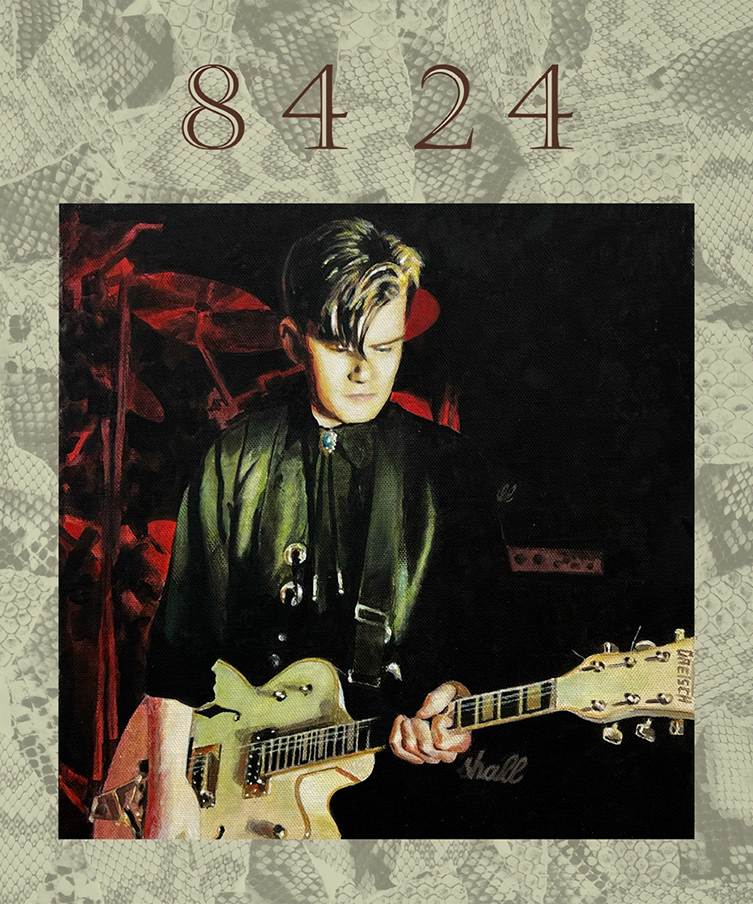
GG: It’s a challenge to play it, and also, everybody wants to see it, don’t they?
BD: They do. They come to see the guitar, not me. I should get the guitar to sign pictures of itself! The guitar gets the round of applause!
GG: So, one thing I didn’t ask you last time was string gauge, and whether that matters to you, between the Gretsch and the Les Paul?
BD: Not really, just very pragmatic stuff. I went through a period when I thought I was a tough guy and was using elevens and then I got older and thought, why fight it? I’ve settled down with tens, which is kinda normal. For the drop-D songs, obviously I do a .048, just to give it a bit less twang.
GG: A bit more balance.
BD: Yeah. For the Gretsches though, Ernie Ball make custom sets for me with longer D’s and G’s, to get a decent amount of wind on them. You can make them work with regular strings but they said they do it for other artists, because it's an incredible distance from the Bigsby all the way along to the end of the Falcon, it takes a time zone change (laughs).
GG: Do you notice much of a difference when playing those strings? Or is it just good to know that it’s like that?
BD: It’s just more for the techs, and the ease of getting an even tension.
Choosing Support Bands & Rumours of New Music
GG: This is a bit of a tangent, but there are some very cool support bands on this tour. Is that something the The Cult are involved in choosing?
BD: Oh, very much so, but I wouldn’t say The Cult’s involved in choosing them, I’d say that Ian Astbury’s involved in choosing the support bands. He seems to have taken that job on. We have an interesting division of labour between the two of us, between the partnership. I take care of certain aspects of things, and he does other stuff. We don’t really clash. So I don’t really get involved.
I got Mike Peters to play in Swansea because of a lot of reasons. I didn’t know at the time - obviously he’s a mate but he’s good, he’s worth a few tickets - and it’s a big venue in a small town. And it turns out he had the whole cancer thing rear up at the time, but it was good.
But Ian likes to pick the support bands, it’s something he’s into.
GG: It makes a big difference to the show.
BD: You’ll see tonight, it definitely challenges the audience’s perceptions.
GG: I love that guy! (we’re talking about Jonathan Hulten).
BD: Yeah, yeah, I do too. But that’s an Ian thing. I stay out of it and we have a happy marriage (laughs)!
GG: Haha, and talking about a happy marriage, I heard at the tail end of last year that there might be some new Cult music on the horizon?
BD: There’s always some new Cult music on the horizon: it just depends how far the horizon is! There’s nothing, I’m gonna bubble burst. There’s nothing. I’m not too sure who said that.
GG: No, I’m not sure either, I think it just came up in my research.
BD: It just happens organically. We don’t sit and go ‘Oh, we’d better start writing some tunes!’ There’s no way at our age and our state of play as a band that we’re gonna be getting together and doing a bit of that, it ain’t gonna happen, trust me! Most bands are like that, in reality.
"I need to be able to go from a Les Paul to a Gretsch and there not be this gargantuan, cataclysmic change. I just don't have the bandwidth mentally onstage to adjust. I'm not an adjuster!"
GG: Well as you say, you’ve been a big band for ages, it’s not like you have to go through the Tuesday night rehearsals.
BD: Yeah, and it’s also about quality not quantity. Obviously, you put me and Ian in a room, we can come up with stuff. But it’s fairly torturous and it takes a long time to really get the wheat from the chaff, and also to try and find out where we can find some common ground in terms of wanting to create new music. It’s probably occurred to you that I’m a little more conservative than Ian in terms of what I consider where I fit into the musical landscape. I’m a bit more traditional in my outlook and Ian likes to be very front-forward and always reaching and working. So, to try to marry those two elements is the art of it. That’s the battle, it just takes a long time. All of them take a long time to do, unfortunately. And we do everything sensible, like it says, you know? Go in a demo studio, get all your songs together, don't go in the real studio until you’ve got the music…we do all of that shit and we still end up maxing out the budget every time! Every time.
GG: Well, you know,you said it yourself man: you’ve got to do it right rather than fast. It’s fine dining, it’s not McDonald’s, you know what I mean?
BD: Yeah, (laughs) but the point is, we are mindful of trying not to waste money. It’s not like we’re buffoons showing up hogging caviar (laughs), it just takes a long time and that costs money over a process, you know? As long as we’re still working together, there’ll always be new music, because it’s kind of a thing that Ian’s more keen on it than me, but I also understand its value to the fans, the real hardcore. I’m sure if we did a survey of the people in attendance tonight, I’d say the vast majority would want to hear all the hits and get home for a cocoa. But, there is quite hardcore devoted element who love the new music and that’s what we’re trying to do in the set, is throw in a few so that it’s not just a nostalgia thing.
GG: Well the thing is, you’ve got enough of the big tunes that there’s always going to be an audience for that stuff.
BD: We were fortunate that we had hits. It kinda dawns on you. I don’t know how many top 30 singles we had in Britain but there were several, definitely more than 6, so if you can put that body of work together, it’s half a fuckin’ set!
GG: Aye.
BD: We don’t do all of them, because there’s always somebody who doesn't wanna do something (laughs), but we always giveth them and taketh them away.
GG: You have to try and make it interesting for yourself.
BD: Try to! I’m personally really loving this set.
Amp Chat
GG: Okay, that’s one of the things I was wondering about. From a guitar point of view, what are the high points for you personally, for moments in songs?
BD: We do a song called War, I like that. Challenging, a lot of tap dancing! I have to pull an amp out to get a really clean sound because I’m a luddite, it’s all old-fashioned speakers and valves.
GG: Is it still Voxes you’re on these days?
BD: Yeah, it’s always the same: there’s always going to be a Marshall-type amp. I’ve been using Friedmans for years. The Vox has a clarity and a poke, and I choose to use the more mass-produced Voxes; I like the down-and-dirtiness of them. The bespoke, hand-wired ones were a bit too 60s and Fab Four for me.
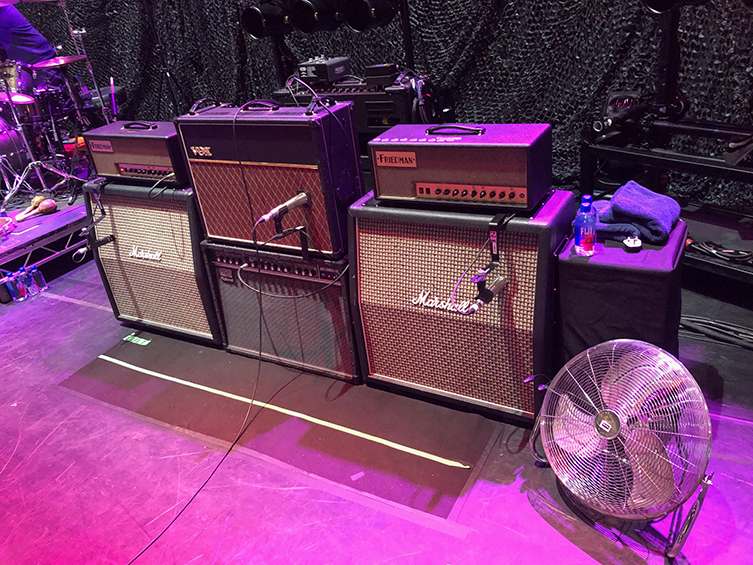
(Photo: Ray McClelland)
GG: I know what you mean, actually.
BD: A bit jangly and clean, and a bit too honest. I just want the Vox to be an extension of the Marshall-type amp. It’s not meant to be two different things, it’s meant to be one wider tonal thing that then services the Gretsch, because you were talking about the width?
GG: Yes.
BD: So, add a Marshall and a Vox, suddenly you’ve got something. I’m looking for that, and then I bring the Roland in and out.
GG: Sure, the Jazz Chorus?
BD: Yeah. They’re really kind to me, but sadly, their newer amps don't quite have the degree of chorus that I’d like…
GG: Something’s happened with the BOSS/Roland Chorus.
BD: On the amp, it’s not as effective as it was. There was a period not so long ago when you could have it as a standard setting and dial it in, and they’ve done away with that, which is a massive mistake. I would honestly say the new ones - which I’m using - are meh with the chorus, and that’s what the amp’s about.
GG: It’s a Jazz Chorus, after all!
BD: It’s a Jazz Chorus. I’m not playing Jazz but I do like the Chorus. It’s a unique sound; it’s an amazing thing that they did, but they’ve kind of watered it down and it just sounds a bit…you know?
GG: A bit generic?
BD: A big generic. I realised that because I have a little JC, a 77 and that’s a more old school one and I was like ‘Fuck me, that’s the sound!’ These new ones are a bit…mmm…
GG: Never mind, at least you’ve got your Voxes and Friedmans right?
BD: Yeah yeah yeah, but I do miss that: it’s a vital part of it, the Roland.
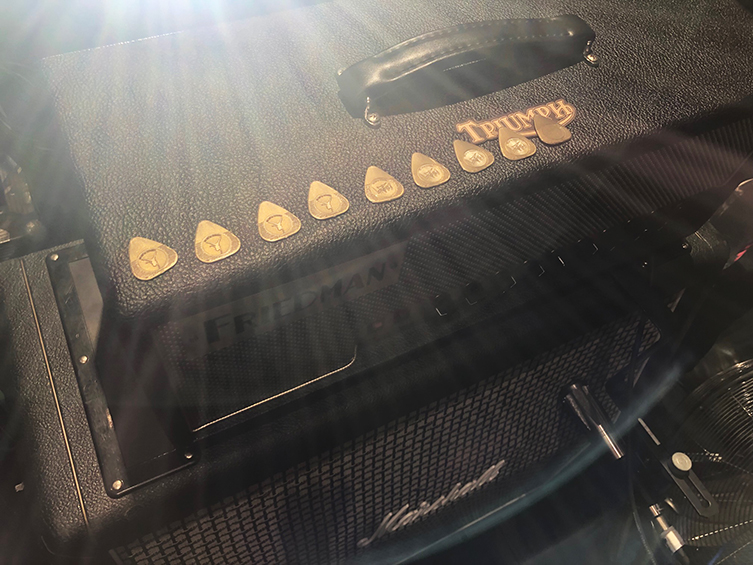
(Photo: Ray McClelland)
What Riff of Someone Elses’ Do You Wish You Had Written?
GG: We need to tell them! Haha! Now, here’s one. It’s fun to ask people about their favourite riffs, but how about this angle: what riff of someone elses’ do you wish you had written?
BD: Oh fuck! That’s a good question…well, there’s a lot! Off the top of my head, I kinda like Love Like Blood. It’s funny, that’s today: if you asked me this tomorrow I’d pick something else. But today, right now, having talked about Geordie and Killing Joke and that stuff, right now: Love Like Blood, I think that’s great. That picked, arpeggiated riff with the chorus shimmer? There’s not a lot going on, but there’s a lot going on. You know what I mean?
GG: The art of economy.
BD: Right! A bit less of the ‘hey mum, look what I’ve learned’ and showing off guys.
GG: It’s one of those ones with Geordie, I kinda feel like sometimes he could’ve done with a little more showing off. I liked the fact that he chose not to, but I feel like it was bubbling under. Maybe that’s the whole point?
BD: That’s an interesting one, because a lot of the guys from the punk era wouldn’t go out and take that extra step, because you're out on the tightrope then. You’d get a lot of criticism and it’s hard. There are super soloists, but they don’t write riffs worth a shit, or songs, or whatever. They’re phenomenal players, but it’s like ‘yeah, but what have you written?’ Then there’s guys who write and they’re a bit too scared to go out there.
GG: And then there’s players like yourself in the middle, with a bit of both.
BD: I try to be! I try to give it a go. Ian was very supportive, everybody in the Love era was like ‘go for it, go for it!’. We went to New York for Electric and Rick and George Draculius were like that too, so I was trying to play guitar like Mick Ralphs or Ronson. All the Les Paul guys, basically.
GG: It’s a more influential sound than I think you get credit for. I was talking to - I’m gonna namedrop now - Dave Navarro recently and he’s a brilliant player. His more alternative arpeggiated thing with the ambient effects alongside the classic riffing: I can hear a lot of Billy Duffy in his playing, and his accessible approach.
BD: We’re from the same era. In his own LA way, Dave grew up, probably liked punk rock, didn’t wanna play punk rock, and was searching. I’ve heard Dave doing Van Halen and all that, a lot of those California guys, their punk scene - whilst there were a few good bands, it wasn’t like the English punk scene - but they had Van Halen playing down the road, you know? You could go and see them play at somebody’s barbecue, so they have that element in their playing, that 80s metal thing, when the metal was kinda naive and cool.
GG: Fun.
BD: Fun! Fun heavy metal. I can’t imagine how much fun it must’ve been in ‘85 when those bands were coming up in Hollywood. We kinda caught the tail end of that.
GG: I feel like The Cult were a huge band over there at that point, you just weren’t of that scene originally.
BD: No, it wasn’t our thing, but we’ve kinda met at that point. But Dave’s got his own thing.
GG: For sure, very much!
BD: And that’s all you can ever hope as a guitar player, is to have your own thing. I would say that’s the most important thing. Talking about Geordie? Dave Navarro? We could go on. In regards to how ‘good’ you think they are - and how you define ‘good’ - they’ve all got their own thing and they’ve all contributed to create music and songs, which to me is really what it’s all about. Whether it’s a song or a story, I just try to help illustrate it with a bit of colour. I don’t see it as being ‘look how clever I am, I’ve been up all night practising scales’, you know?
GG: It’s like with all of the technically incredible drummers that are out there, everybody still says, ‘Yeah, John Bonham’s the best’.
BD: Yeah, yeah he is. True! He kind of is.
GG: He kind of is, and as it is with guitars, you can be impressive, but there’s something about having substance.
BD: At the end of the day, it’s about heart, I think. And belief, and honestly believing in what your doing has validity. And coming not from places like ego, but a place of belief. I still believe in the power of rock n roll.
GG: That’s brilliant.
BD: You know what I mean? I still do. In its widest sense, I still believe. Nothing makes me feel better than seeing some 14 year old losing their shit in the front row, because they finally got to see somebody in a band - me or Ian - who their dad probably played their records, and they’ve discovered, that one kid in a hundred goes ‘modern music’s kinda shit’ - not exclusively shit, but for the most part it’s shit - and you see them transforming.
GG: Their Road to Damascus moment!
BD: Yeah! They do, and that to me is the biggest buzz of all.
And with that, Billy was needed out on the stage. Those last few lines sum everything up, and it’s a most excellent thing to hear such unjaded comments from a musician who’s been in the big leagues for most of their lives. Inspiring is not the word!
As ever, Billy was great fun to talk to, and a gentleman to boot. The gear pictures you’ve seen on the stage were all taken by me at Billy’s invitation. He and the entire Cult crew went above and beyond, and I owe them a great debt of thanks for their time, generosity and good humour.
The same goes to Mick Peek for all of his help, and to yourself for taking the time to read another exclusive guitarguitar interview. Keep up with The Cult on the official Cult website, where tour dates, merch and more can be found.
Keep an eye out for the forthcoming interview with Jonathan Hulten, whom you may well have seen on this tour with The Cult! Head over to the guitarguitar Interviews page for over 200 interviews just like this one, with artists such as Dave Navarro, The Doors and many more!


